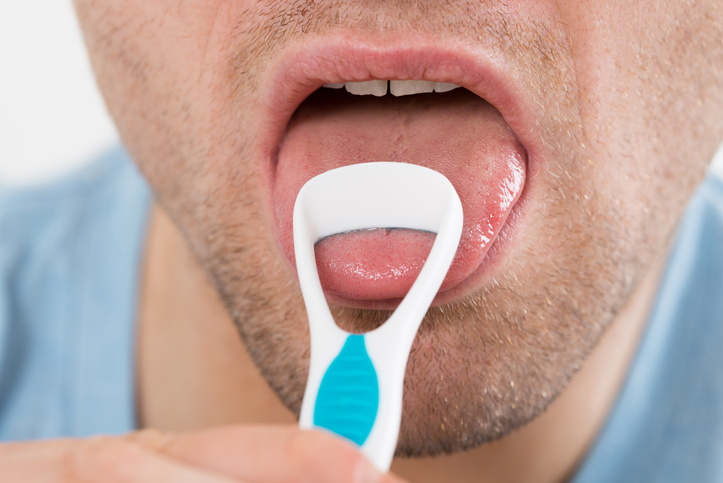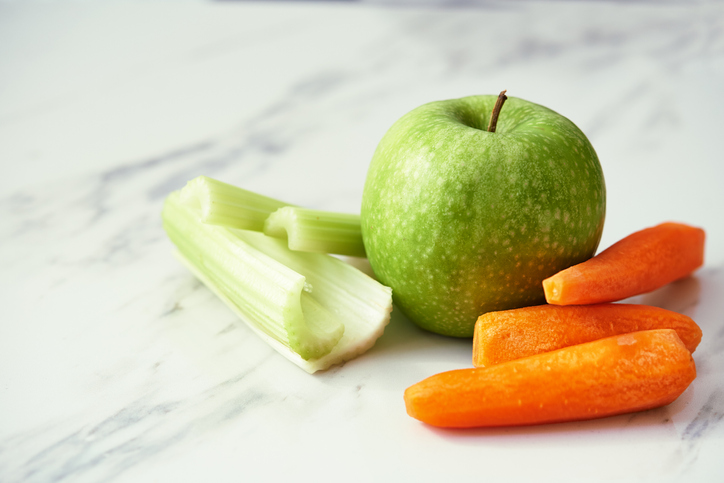Bad breath, or halitosis, can be a persistent and embarrassing issue for many despite their dedication to brushing and flossing. If you’ve found yourself wondering why your breath doesn’t quite stay as fresh as you’d like it to be, the answer might lie in an often overlooked area—your tongue. Tongue hygiene is a key factor in the battle against bad breath, and in this article, we’ll explore why it matters and offer some fun and effective methods to keep your tongue in tip-top shape.
The Neglected Culprit: Your Tongue
While regular brushing and flossing are crucial for maintaining healthy teeth and gums, they may not be sufficient to combat bad breath entirely. The tongue, with its textured surface, provides an ideal breeding ground for bacteria. The microscopic crevices on the tongue’s surface can trap food particles and bacteria, leading to the formation of a sticky film known as plaque.

As bacteria break down leftover food particles, they release sulfur compounds, which are the primary culprits behind bad breath. Unfortunately, these bacteria often reside on the back of the tongue, an area that can be challenging to reach with a toothbrush alone. This is where dedicated tongue cleaning comes into play.
The Importance of Tongue Cleaning
Tongue cleaning is an essential aspect of a comprehensive oral hygiene routine, and it offers several benefits beyond just freshening your breath. Here are some reasons why you should make tongue cleaning a non-negotiable part of your daily oral care:
- Reducing Bacteria: By cleaning your tongue regularly, you can remove the buildup of bacteria that contribute to bad breath. This not only helps in preventing halitosis but also promotes overall oral health.
- Improved Taste Perception: A cleaner tongue enhances your taste perception. The removal of bacteria and debris allows your taste buds to function more effectively, enhancing your enjoyment of food.
- Preventing Plaque Formation: Regular tongue cleaning helps prevent the formation of plaque on the tongue’s surface. This is crucial for avoiding dental issues such as tooth decay and gum disease.
- Enhancing Digestive Health: The tongue plays a role in the initial stages of digestion by aiding in the breakdown of food. A cleaner tongue can contribute to better digestive health.
- Overall Oral Hygiene: Tongue cleaning complements your existing oral care routine, ensuring a more thorough and comprehensive approach to maintaining a healthy mouth.
Fun and Effective Tongue Cleaning Methods
Now that we’ve established the importance of tongue cleaning, let’s explore some fun and effective methods to incorporate into your daily routine:
Tongue Scraper

Invest in a tongue scraper, a simple yet highly effective tool designed specifically for cleaning the tongue. Using a scraper is easy – gently glide it over the surface of your tongue from back to front, removing the accumulated debris. Make sure to rinse the scraper after each use.
Tongue scrapers come in a range of materials, such as plastic, metal, silicone, bamboo, and more. Additionally, there are electric scrapers and tongue brushes. The tongue brush, resembling a toothbrush with a slightly different shape, is specifically designed for cleaning the tongue.
Toothbrush Technique
If you don’t have a tongue scraper, don’t worry; your toothbrush can also get the job done. After brushing your teeth, use the bristles of your toothbrush to gently clean your tongue. Brush from the back to the front, covering the entire surface. Remember to be gentle to avoid irritation.
Oil Pulling

Incorporate oil pulling into your routine for a natural and holistic approach to tongue cleaning. Swish a tablespoon of coconut or sesame oil in your mouth for about 15-20 minutes, making sure to pull the oil between your teeth and over your tongue. Spit out the oil (into a trash can, not the sink), and rinse your mouth thoroughly. Oil pulling is believed to contribute to oral health in several ways:
- Reduction of Harmful Bacteria: Both coconut and sesame oils have natural antimicrobial properties. When swished around in the mouth during oil pulling, these oils may help reduce the levels of harmful bacteria. Specifically, coconut oil contains lauric acid, known for its antimicrobial and anti-inflammatory properties.
- Plaque Reduction: The swishing action during oil pulling helps to dislodge and break down plaque on the teeth and gums. Plaque is a sticky film of bacteria that, if not removed, can contribute to tooth decay and gum disease.
- Prevention of Bad Breath: Oil pulling is often recommended as a method to combat bad breath. By reducing the bacteria in the mouth, particularly on the tongue and in hard-to-reach areas, it can contribute to fresher breath.
- Gum Health: The anti-inflammatory properties of coconut and sesame oils may also benefit gum health. By reducing inflammation, oil pulling could potentially contribute to healthier gums.
- Natural Moisturization: Oil pulling is believed to help moisturize the oral tissues. This can be especially beneficial for individuals with dry mouth, as it may help alleviate discomfort and promote a healthier oral environment.
It’s important to note that while many people find oil pulling to be a helpful addition to their oral care routine, scientific evidence supporting all of its claimed benefits is limited. Some studies suggest positive effects on oral hygiene, but more research is needed to fully understand the extent of these benefits.
Hydration
Staying hydrated is a simple yet effective way to promote tongue health. Drinking an adequate amount of water helps flush out bacteria and debris, preventing the buildup of plaque on the tongue’s surface.
Mouthwash with Tongue Care
Opt for an antiseptic mouthwash that specifically targets bacteria on the tongue. These mouthwashes often contain ingredients like cetylpyridinium chloride or chlorine dioxide, which help eliminate bacteria responsible for bad breath.
Fruits and Vegetables
Increase your intake of crunchy fruits and vegetables like apples, carrots, and celery. Chewing these foods stimulates saliva production, which naturally cleanses the tongue and helps maintain oral health. We wrote a whole article on how saliva keeps your mouth healthy. Check it out.

Here are some fruits and vegetables that are known to help clean your teeth:
- Apples: Chewing apples stimulates saliva production, which helps neutralize acids and wash away bacteria. The fibrous texture of apples can also help scrub the surfaces of your teeth.
- Carrots: Like apples, carrots are crunchy and fibrous, promoting saliva production and aiding in the mechanical cleaning of teeth. They are also rich in vitamin A, which is essential for maintaining healthy gums.
- Celery: Celery’s high water content and fibrous texture make it an excellent choice for naturally cleaning teeth. Chewing celery can help dislodge food particles and stimulate saliva production.
- Strawberries: Strawberries contain malic acid, a natural astringent that can help remove surface stains from teeth. However, it’s essential to note that while strawberries may have some teeth-whitening properties, they also contain sugars and acids, so it’s best to rinse your mouth with water after consuming them.
- Broccoli: Broccoli is a nutrient-rich vegetable that contains iron, which helps form an acid-resistant film on the teeth, protecting them from decay. Its crunchiness can also assist in cleaning teeth.
- Pineapple: Pineapple contains bromelain, an enzyme with anti-inflammatory properties. While it won’t necessarily clean teeth directly, its natural sugars are less likely to contribute to tooth decay compared to processed sugars. Additionally, the pineapple’s natural acidity can help break down plaque.
- Cucumbers: Cucumbers have a high water content, which helps to hydrate the mouth and stimulate saliva production. Chewing on cucumber slices can also help clean teeth by removing debris.
- Leafy Greens: Vegetables like spinach and kale are rich in calcium, which is crucial for maintaining strong teeth. They also contain folic acid, which may contribute to gum health.
- Kiwi: Kiwi is rich in vitamin C, which is essential for gum health. Additionally, the small seeds in kiwi can act as a natural scrub for the teeth.
While these fruits and vegetables can contribute to oral health, it’s important to note that they are not a substitute for regular brushing, flossing, and professional dental care. Additionally, moderation is key, as some fruits, especially citrus fruits, contain acids that, in excess, could potentially contribute to enamel erosion. Maintaining a balanced diet and good oral hygiene practices are crucial for overall dental health.
Don’t Neglect The Tongue!
While brushing and flossing are vital components of oral hygiene, the tongue should not be neglected in the pursuit of fresh breath and a healthy mouth. By incorporating tongue cleaning into your daily routine and trying out these fun and effective methods, you can take a significant step towards banishing bad breath and enjoying the confidence that comes with a truly fresh smile. A clean tongue is not just a cosmetic choice; it’s a key factor in your overall oral health. So, don’t let your tongue be the forgotten factor in your quest for a healthier, more vibrant smile.
If you need additional help with bad breath, call Dr. Scharf to schedule a consultation. He can help you gain the freshness you’re looking for.
